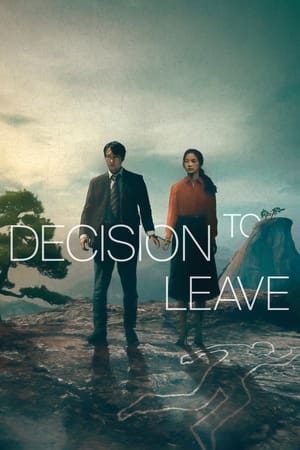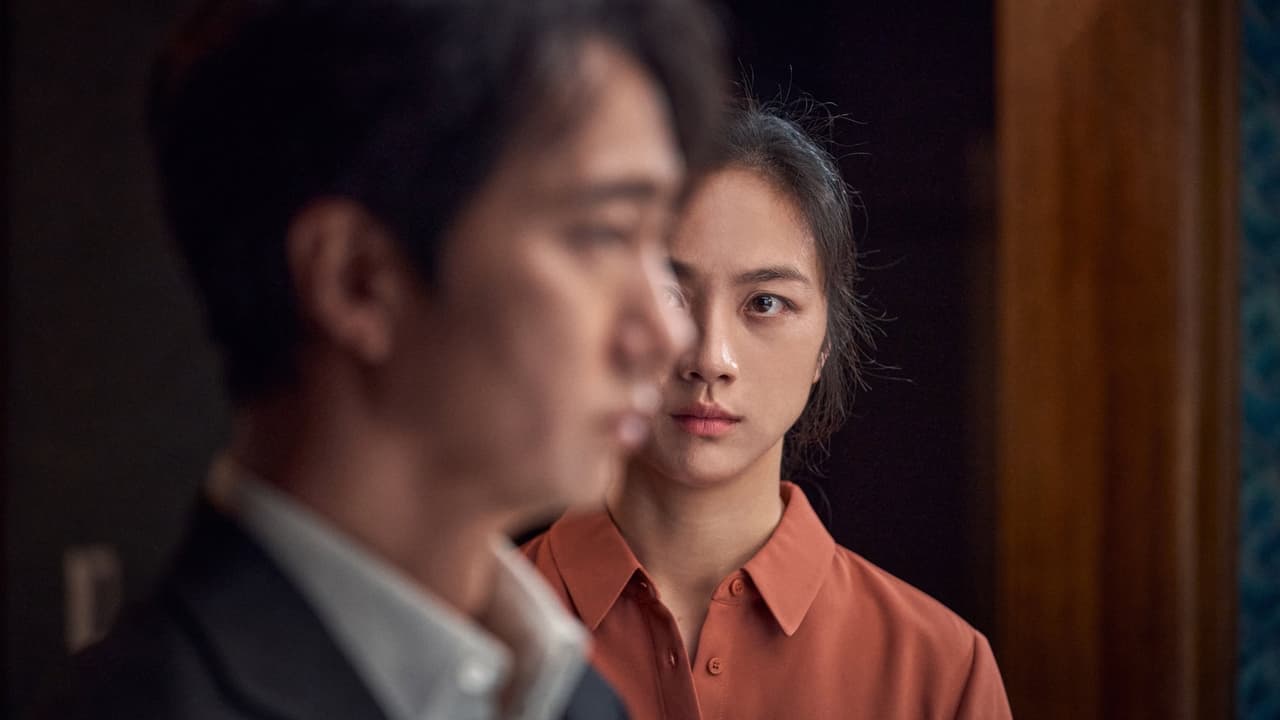
Park Chan-wook received the Best Director prize at this year’s Cannes Film Festival, and though I’ve only seen, at this writing, five of the 21 features that screened in Competition, it’s hard to imagine that Vincent Lindon’s jury (which included Asghar Farhadi, Rebecca Hall, Joachim Trier, and Jeff Nichols, among others) didn’t make the correct choice. Decision to Leave is the kind of formally virtuosic movie that restores your faith in cinema’s unique power, achieving many of its strongest emotional effects via breathtakingly precise compositions and disorientingly unconventional editing. A few striking shots, like the early one that depicts a corpse’s POV as ants scramble across its eyeballs, could perhaps be dismissed as Park merely showing off. But even something as mundane as a woman brushing her teeth in a police-station bathroom sees him find a location and an angle that accentuate the character’s internal state (isolation, in this instance). You know, like the medium’s supposed to do. By the time a routine interrogation gets expertly fragmented into multiple images, as seen directly and on video monitors in a viewing room and reflected in the glass separating the two rooms—all at the same time!—I was damn well ready to give Park an award myself.
It's not as if Decision to Leave employs dazzling visuals to compensate for a humdrum narrative, either. More of a humdinger, once you finally get a handle on it. Admittedly, that takes a while, because Park and his regular co-screenwriter, Jeong Seo-kyeong (she’s been collaborating with him since 2005’s Lady Vengeance), kick things off with what seems like a random collection of episodes involving Busan homicide detective Hae-jun (Park Hae-il, best known for his work with Bong Joon-ho in Memories of Murder and The Host). Only in hindsight does it become clear that this initial flurry is meant to indicate Hae-jun’s relative detachment, from both his hotheaded younger partner (Go Kyung-pyo) and his loving but slightly overbearing wife (Lee Jung-hyun). Indeed, he’s physically detached from the latter much of the time, living in a rented Busan apartment during the week and coming home (to what the subtitles call Ipo; if I’m correct in thinking that’s short for Ipo-ri, it’s a distance of roughly 175 miles) only on weekends. His latest case, looking into a sixty-ish man who fell to his death from the peak of a small mountain he’d climbed, at first seems no different from others. “That’s when she walked through the door,” a vintage pulp novel would say.
15 years have passed since Tang Wei set the screen on fire in Ang Lee’s Lust, Caution, and while she’s worked steadily since—even showing up as the female lead in Michael Mann’s Blackhat—she never exploded into the sort of stardom that I’d anticipated from that introductory burst of old-school glamour and charisma. Decision to Leave finally gives her another showstopping role, as the dead climber’s suspiciously non-distraught widow, Seo-rae, who positively radiates the knowing vibe of a woman with startling secrets. Seo-rae has an obvious motivation for killing her husband, who regularly beat her, but her alibi checks out: She was at work as a caregiver to the elderly, verified by both her boss and by the patient in question. Even more crucially, Hae-jun doesn’t want to believe that she’s guilty, as he’s gradually fallen for her over the course of sleepless nights staking out her apartment, watching her eat ice cream for dinner in front of the TV set. Park stages these surveillance scenes by intermittently shooting both characters in the same space, as if Hae-jun were mentally projecting himself into closer proximity to Seo-rae. He also makes it clear that Seo-rae is very much conscious of being observed, though we can’t discern how she feels about it.
That uncertainty fuels a potent and perverse obsessive romance—one’s that all the more remarkable given that Park, who’s by no means bashful when it comes to onscreen eroticism (as The Handmaiden, in particular, decisively demonstrated), opts for a more classical and subdued approach here. (The same is true of violence, which we see only as aftermath. This has disappointed some of the director’s fans, who prefer his more outré side; I tend to favor restraint, so calibrate as needed.) Seo-rae and Hae-jun never so much as kiss, but I can’t recall the last movie make-out session that seemed half so erotic as a scene in which Seo-rae helps Hae-jun, who suffers from insomnia, fall asleep by having him regulate his breathing with hers, leaning over him so that he can better hear her inhale and exhale, their lips just inches apart. The film also gets surprising mileage from applications of hand cream and lip balm, though one of those does double duty as a clue to the mystery. Stories of cops and suspects who are hot for each other have been a staple of film noir and crime dramas throughout cinema history, and Seo-rae, for a while, snugly fits the generic femme fatale, who may or may not be guilty of something and may or may not be playing the lawman for her own benefit. Even so, Park and his two lead actors bring plenty that’s distinctive to the scenario, had it continued in that familiar vein.
It does not. About an hour into Decision to Leave’s deliberately-paced but always absorbing 138 minutes, everything shifts, though at first we’re only aware of having leapt forward in time some 13 months, with Hae-jun now working in Ipo, and Seo-rae, unbeknownst to him, likewise living there, recently remarried. I don’t want to reveal what precipitates this rupture, nor do I much want to get into what follows it—those are pleasures you should experience for yourself. At the risk of still giving too much away, though, I’ll note that the film unexpectedly reveals itself as the finest riff on Vertigo in many years—perhaps the only one I’ve ever seen that re-thinks that masterpiece’s corrosive dynamic in a way that does justice to the original, by transferring its anguished masochism from stalker to stalkee (and reversing their roles). The one significant downside to this bold move is that it demands more of Park than he can deliver without overacting; having seen Tang opposite Tony Leung in Lust, Caution, I kept imagining how much less inclined he would have been to telegraph emotions at key junctures. Then again, quite a bit of the offbeat passion between these two characters is rooted in their different nationalities: While Seo-rae speaks reasonably fluent Korean, she occasionally uses stilted phrasing (at which Hae-jun pokes fun), and at moments of stress will whip out her smartphone and speak Mandarin (I think) into a translation app, which then reads the Korean text in a robotic male voice.
Whether or not the intrigue and the obsession and the perfectly devastating downbeat ending work for you, there’s just no denying the singular visual experience that this movie offers, which to my mind makes Park’s previous films look comparatively timid (even as they’re generally more graphic when it comes to sex and violence). Editor Kim Sang-beom (who’s been working with Park since 2000’s Joint Security Area) repeatedly executes brief…I’m not sure whether it’s more accurate to call them flashbacks or flash-forwards, as they oscillate back and forth; we’ll be looking at Hae-jun confronting a criminal on a rooftop, then abruptly cut to him sitting in what looks like a food court, then back to the rooftop (where something has happened since), then back to the food court again, then back to the rooftop (providing still more information), all in a few seconds. It’s established early on that the lights in Seo-rae’s hallway flicker, and at one point Park superimposes that flicker onto a shot of Hae-jin in another location entirely, by way of connecting the two. I chortled in delight when, after Seo-rae invites Hae-jin to come to her apartment, the camera gives us a close-up of his car’s digital speedometer climbing from 80 kilometers per hour to more than 100, then racks focus to his wedding ring on the hand gripping the steering wheel. This is a filmmaker who’s still exploring his chosen medium with a neophyte’s giddy enthusiasm, more than two decades into his career. It’s thrilling to watch.
One of the first notable online film critics, having launched his site The Man Who Viewed Too Much in 1995, Mike D’Angelo has also written professionally for Entertainment Weekly, Time Out New York, The Village Voice, Esquire, Las Vegas Weekly, and The A.V. Club, among other publications. He’s been a member of the New York Film Critics Circle and currently blathers opinions almost daily on Patreon.






